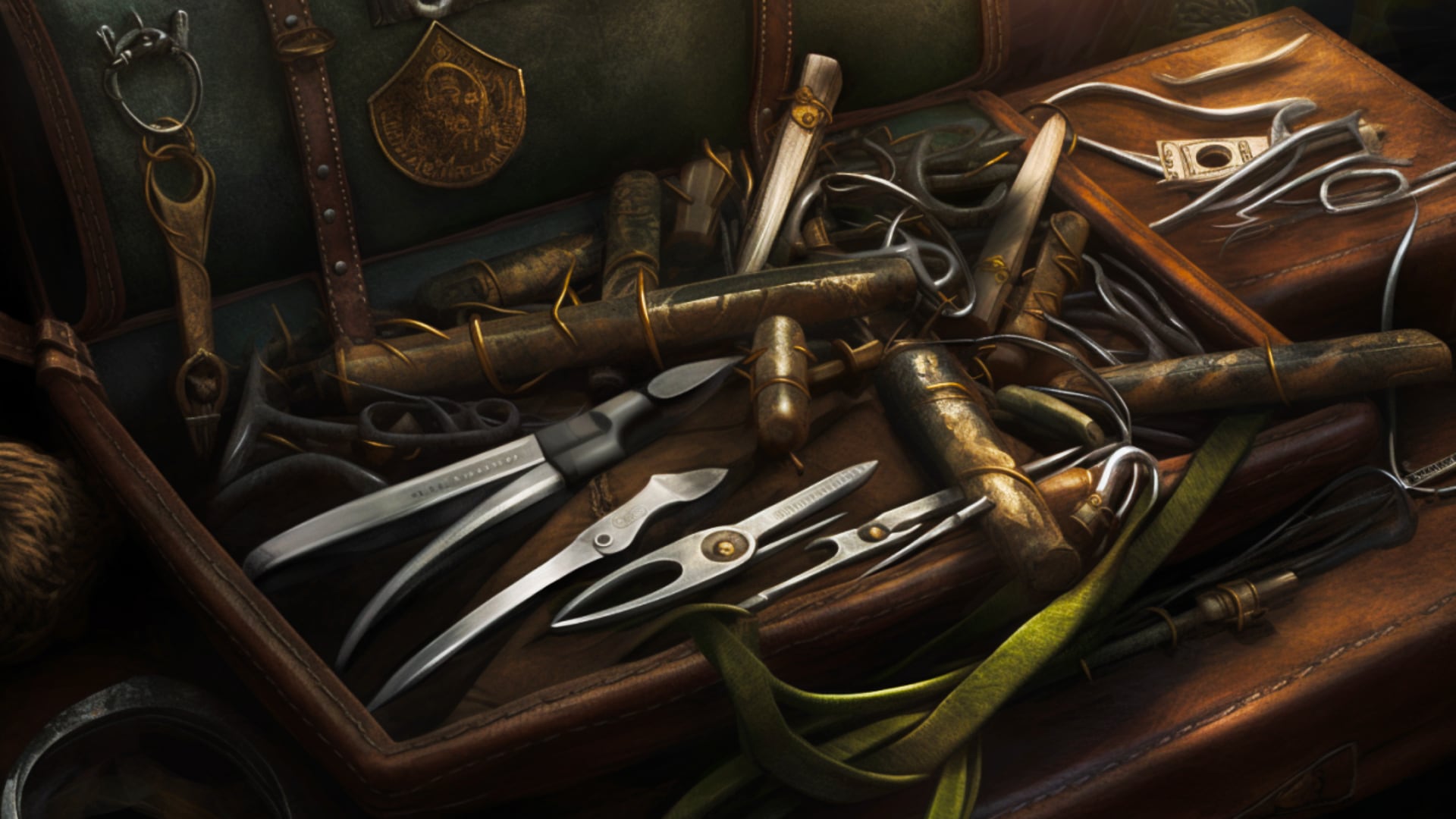Artisan’s tools in D&D 5e aren’t just flavor; they’re a pathway to impactful gameplay, enhancing your character’s abilities and opening up new avenues for adventure. From crafting essential gear to deciphering ancient riddles, the right set of artisan’s tools can be the key to success. This comprehensive guide delves into the seventeen distinct artisan’s tool sets, empowering players to embody a wide range of professions and add depth to their campaign narratives.
Understanding the Value of Artisan’s Tools
Artisan’s tools provide both mechanical advantages and rich roleplaying opportunities. They are key for crafting and interacting with the game world in meaningful ways. Mastering these tools grants more than just proficiency bonuses; it unlocks crafting opportunities, deepens roleplaying, and adds a tangible dimension to your character’s profession.
Why Your Character Needs Artisan’s Tools
These tools are not merely decorative; they provide tangible benefits. Proficiency grants a bonus to relevant ability checks, and synergy with related skills can provide advantage on those checks, offering further insights. Crafting becomes possible, enabling the creation of specific items. Furthermore, they enhance roleplaying by allowing players to truly embody their character’s profession, expanding gameplay options and adding a touch of realism to their actions.
The 17 Types of Artisan’s Tools
D&D 5e offers a diverse range of artisan tool proficiencies:
- Alchemist’s Supplies
- Brewer’s Supplies
- Calligrapher’s Supplies
- Carpenter’s Tools
- Cartographer’s Tools
- Cobbler’s Tools
- Cook’s Utensils
- Glassblower’s Tools
- Jeweler’s Tools
- Leatherworker’s Tools
- Mason’s Tools
- Painter’s Supplies
- Potter’s Tools
- Smith’s Tools
- Tinker’s Tools
- Weaver’s Tools
- Woodcarver’s Tools
A Deep Dive into Each Tool Set
Each tool set has unique applications, costs, and benefits. Let’s explore them in detail:
| Tool Set | Cost | Weight | Associated Skills | Example Uses | Crafting Potential |
|---|---|---|---|---|---|
| Alchemist’s Supplies | 50 gp | 8 lb | Arcana, Investigation | Identifying poisons, creating alchemical items (acid, alchemist’s fire), analyzing substances | Potions, explosives, alchemical remedies |
| Brewer’s Supplies | 20 gp | 9 lb | Brewing beverages, creating specialized drinks, potentially developing potent sleeping draughts or poisons | Potions, consumables, alcoholic drinks | |
| Calligrapher’s Supplies | 10 gp | 5 lb | Creating forgeries, crafting beautiful invitations, deciphering scripts, creating coded messages | Documents, art, secret missives | |
| Carpenter’s Tools | 8 gp | 6 lb | Constructing structures, repairing ships, crafting traps, creating makeshift barricades, reinforcing doors | Buildings, furniture, siege weaponry | |
| Cartographer’s Tools | 15 gp | 6 lb | Drawing accurate maps, charting unexplored territories, navigating treacherous terrain, deciphering ancient maps | Maps, charts, navigational aids | |
| Cobbler’s Tools | 5 gp | 5 lb | Repairing footwear, crafting simple leather goods, potentially even using leather scraps to create makeshift armor patches | Boots, shoes, sandals, leather goods | |
| Cook’s Utensils | 1 gp | 8 lb | Preparing meals, creating flavorful dishes, potentially even using spices to create makeshift smokescreens or irritants, identifying ingredients | Food, feasts, potentially poisoned dishes | |
| Glassblower’s Tools | 30 gp | 5 lb | Shaping delicate glass objects, creating intricate vials, crafting lenses, repairing broken glass items | Bottles, vials, decorative glass items, lenses | |
| Jeweler’s Tools | 25 gp | 2 lb | Crafting exquisite jewelry, repairing precious gems, appraising valuable stones, creating intricate clockwork mechanisms | Rings, necklaces, earrings, other adornments | |
| Leatherworker’s Tools | 5 gp | 5 lb | Crafting sturdy leather armor, creating fashionable clothing, repairing harnesses, crafting pouches and bags | Armor, clothing, saddles, leather goods | |
| Mason’s Tools | 10 gp | 8 lb | Constructing stone walls, building fortifications, repairing damaged structures, sculpting, assessing structural integrity | Walls, buildings, fortifications | |
| Painter’s Supplies | 10 gp | 5 lb | Creating breathtaking paintings, forging artwork, disguising objects with paint, creating camouflage | Paintings, portraits, disguises | |
| Potter’s Tools | 10 gp | 3 lb | Crafting sturdy pottery, creating delicate ceramics, designing intricate tiles, creating small figurines | Pots, jars, plates, tiles, figurines | |
| Smith’s Tools | 20 gp | 8 lb | Forging powerful weapons, crafting sturdy armor, repairing metal objects, crafting tools, working with metal | Weapons, armor, tools, metalwork | |
| Tinker’s Tools | 50 gp | 10 lb | Repairing broken devices, crafting ingenious contraptions, disabling traps, creating small mechanical devices | Traps, clocks, mechanical devices, small inventions | |
| Weaver’s Tools | 1 gp | 5 lb | Weaving fine cloth, creating intricate tapestries, repairing torn garments, creating rugs | Clothing, tapestries, rugs | |
| Woodcarver’s Tools | 1 gp | 5 lb | Carving intricate designs, crafting wooden sculptures, repairing wooden objects, creating furniture | Furniture, sculptures, decorative items |
Crafting with Artisan’s Tools
Crafting is a core function of artisan’s tools. Creating mundane items requires proficiency, raw materials (typically half the item’s value in gold), and time (usually one week for every 50 gp of value). Multiple crafters working together can reduce this time. Magical item crafting is more complex and detailed in the Dungeon Master’s Guide (DMG). Alchemist’s Supplies allow for creating specific items during a long rest.
Beyond Crafting: Unconventional Applications
Think outside the box! Artisan’s tools can be surprisingly versatile. A woodcarver might forge a royal seal, a calligrapher could pen a coded message, or a mason might spot structural weaknesses. They can even be useful in combat, like an alchemist creating a smokescreen or a carpenter reinforcing a door.
Proficiency and Skills: A Powerful Combination
Proficiency with artisan’s tools grants a bonus to related ability checks. Combining this with a related skill from Xanathar’s Guide to Everything (XGtE) often grants advantage on those checks, significantly boosting your chances of success. For example, a carpenter proficient with their tools and possessing a high Wisdom (Perception) score might notice subtle structural flaws. A rogue proficient with Thieves’ Tools and expertise in Dexterity (Sleight of Hand) becomes a lock-picking prodigy.
Downtime and Income: Profit from Your Craft
Downtime activities, like brewing ales or crafting jewelry, can generate income, the amount depending on skill checks and lifestyle choices (see XGtE for details).
Artisan’s Tools vs. Other Tools
Disguise kits and forgery kits serve specific tasks, while artisan’s tools represent broader crafts. This subtle distinction clarifies their roles in gameplay.
Tips for Dungeon Masters
Encourage creative tool use! Design scenarios rewarding ingenuity beyond combat. A locked door might yield to tinker’s tools, a hidden message to calligrapher’s supplies, or a collapsing tunnel to mason’s tools. Consider awarding inspiration for clever applications. Incorporating tools into challenges enhances player agency and immersion. Some DMs even allow proficiency to provide advantage on related checks. For instance, a mason proficient with their tools might gain advantage on a Perception check to spot a weakness in a stone wall.
Delve into the celestial wonders and uncover the myths surrounding the altar constellation. Perhaps your players’ artisan skills could even help decipher its secrets.
There is ongoing debate among players and DMs about specific tool applications, with many exploring expanded uses. This guide provides a foundation, but the true potential of artisan’s tools lies in the creativity of players and DMs. Embrace the possibilities, get creative, and watch your D&D 5e games flourish.
- 1 Liter to Fluid Ounces: Easy Conversion Guide - April 9, 2025
- Unlock what is the seventh month: A Cross-Cultural Calendar Guide - April 9, 2025
- Discover White Fruits: Ultimate Guide to Taste & Nutrition - April 8, 2025
















